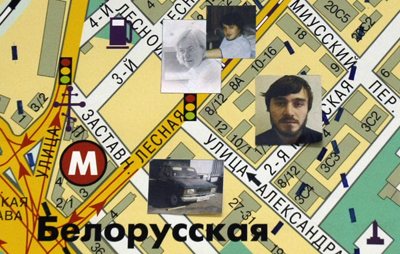Moscow, September 30, 2010–Top Russian investigators have pledged to pursue 19 cases of murdered journalists presented to them by a delegation from the Committee to Protect Journalists, reopening several closed cases and pursuing new leads in a number of other probes.
The CPJ delegation, led by board member Kati Marton and CPJ Chairman Paul Steiger, met Tuesday with Aleksandr Bastrykin, chairman of the Investigative Committee, and a dozen investigators probing individual cases. “It’s a matter of honor for us to solve these murders,” Bastrykin told the CPJ delegation. “It’s a matter of proving our professionalism.”
The Investigative Committee, responsible for probing the most serious crimes in Russia, has been given greater autonomy under a plan announced this week that has the agency reporting directly to President Dmitry Medvedev. The Investigative Committee had previously reported to the federal Prosecutor General’s office.
“We were encouraged by our three-hour-long meeting with the Investigative Committee and the thorough, detailed briefing we received,” Marton said. “Investigators reported progress in a number of cases. Of course, we will not be satisfied until we see prosecutions and convictions.”
Marton and other CPJ representatives met with the Investigative Committee in September 2009 to discuss the string of unsolved journalist murders in Russia. Investigators invited CPJ to return to Moscow this year for an update. Here are highlights of what investigators told the CPJ delegation:
- Anna Politkovskaya‘s killers were motivated by a desire to ingratiate themselves with Chechen President Ramzan Kadyrov, investigators said. There is no evidence directly linking the crime to Kadyrov, they said. A suspect has fled Russia and is believed to be in a European country. Bastrykin told CPJ he will travel to that country to seek the suspect’s arrest and extradition. Bastrykin said that prosecutors had “rushed” an earlier case to court. A jury acquitted two alleged accomplices in that case.
- Authorities said they are trying to locate and arrest a Chechen guerrilla fighter, Alkhazur Bashayev, who they allege murdered Grozny-based journalist and human rights defender Natalya Estemirova in July 2009. News reports have suggested that Bashayev himself has been killed, but investigators told CPJ he is alive and in Russia. Investigators told CPJ they have questioned Kadyrov, but found no evidence of his involvement.
- A criminal case has been reopened into the 2003 death of Novaya Gazeta deputy editor Yuri Shchekochikhin, who died after a sudden illness. His colleagues suspect he may have been poisoned. Investigators told CPJ that they are examining undisclosed new evidence in the case.
- CPJ was told that two other previously suspended criminal cases have been reopened–the 2005 killing in Azov of Puls-TV cameraman Pavel Makeev, and the 2006 killing of Vagif Kochetkov, a reporter with the Tula-based newspaper Molodoi Kommunar. Makeev’s death had been classified as a car accident, while a suspect was previously acquitted in the killing of Kochetkov.
- A new investigator has taken over the probe in the 2004 murder of Forbes Russia editor Paul Klebnikov. No advances in the case were reported.
- Two suspects are awaiting trial in the 2009 murder of Novaya Gazeta freelancer Anastasiya Baburova and human rights lawyer Stanislav Markelov. Detectives are also investigating a number of individuals as accomplices in the crime.
- Investigators told CPJ that the probe into the 2008 killing of Ingushetiya website publisher Magomed Yevloyev could be reopened on appeal.
On Monday, the CPJ delegation attended the trial of Oleg Orlov, chairman of the Moscow-based human rights organization Memorial, who is facing criminal defamation charges brought by Kadyrov. Orlov had publicly said Kadyrov was “responsible” for the murder of Estemirova, who worked for Memorial in Chechnya.
CPJ representatives also visited environmental journalist Mikhail Beketov, recovering in a Moscow hospital following a near-fatal beating in November 2008. Beketov had been reporting on a proposed highway construction project in Khimki, outside Moscow, which would have destroyed a local forest. He suffered brain damage and lost his ability to speak. CPJ committed to help raise funds for his ongoing care. The probe into the brutal attack has been suspended, with no suspects in custody.
In addition to Marton and Steiger, the CPJ delegation included Executive Director Joel Simon, Europe and Central Asia Program Coordinator Nina Ognianova, and Brussels-based Senior Advisor Jean-Paul Marthoz.
Russia ranks eighth on CPJ’s Impunity Index, a list of countries where journalists are killed regularly and governments fail to solve the crimes. Nineteen journalists have been murdered in the country since 2000, according to CPJ research. CPJ’s work in Russia is part of the organization’s Global Campaign Against Impunity, which is funded by the John S. and James L. Knight Foundation.
